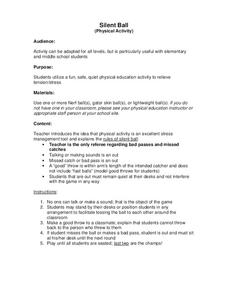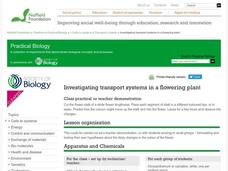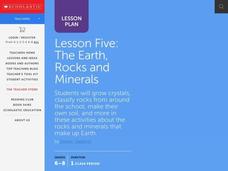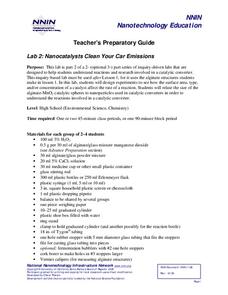Ready Houston
Make a Plan. Build a Kit. Stay Informed.
Help prepare your youngsters for an emergency or natural disaster by discussing important topics as where to meet, how to remain in contact, and what belongs in an emergency kit.
Curated OER
Candlemaking
There might not be a butcher or baker, but you'll have a class full of candlestick makers after a hands-on lesson about candles make from beeswax. After a brief history of where beeswax comes from, young artisans craft their own...
San Francisco Unified School District
Silent Ball
Just as you've lined up the class to go to recess, it begins pouring rain and all chaos breaks loose. What do you do? It's time for silent ball! The rules include no talking, and you must catch the ball. If you talk, drop the ball, or...
Agency for Toxic Substances and Disease Registry
Don't Mess with Mercury (Lesson A)
Mercury is the only metal that is a liquid at room temperature. Teach your class this and many more interesting mercury facts by assigning an engaging task. A public relations activity, the exercise informs pupils of the hazards of...
Nuffield Foundation
Investigating Transport Systems in a Flowering Plant
Some weddings have flowers in a unique, unnatural color to match the theme. Young scientists take part in this process to learn about the function of the xylem as they observe colored water moving through a flower. Then, they experiment...
Perkins School for the Blind
Conductors of Heat - Hot Spoons
Why is the end of a spoon hot when it's not all the way in the hot water? A great question deserves a great answer, and learners with visual impairments will use their auditory and tactile senses to get that answer. A talking...
Baylor College
Energy Sources
Take the concept of burning calories to a more literal level in the second of seven lessons about energy in the realm of food and fitness. Using simple materials, groups will burn breakfast cereal and a pecan to see which one gives off...
Baylor College
Fungus Among Us
In order to learn that mold spores can be found in the air, observers grow bread mold and make observations for a few days. Afterward, they participate in a class discussion to arrive at the knowledge that bread spores are present in the...
Perkins School for the Blind
Treasure Hunt
On, over, and under are some very common prepositions; but how can you teach these concepts to children with visual impairments? Here, is one way. Kids will practice following verbal commands as they go on a classroom treasure hunt. They...
Texas State Energy Conservation Office
Investigation: Insulation
Youngsters compare the heat-holding abilities of three different cans by insulating two with different materials and measuring the temperature change of hot water over a 20-minute period.
EduGAINs
Form and Function
Will that structure survive the force? The differentiated lesson allows pairs to choose the structure they would like to construct and the building materials they wish to use. Individuals record their findings in the observation chart...
Rainforest Alliance
Protecting the Critical Habitat of the Manatee and Loggerhead Turtle
Explore ocean habitats with a lesson plan that showcases the home of manatees and loggerhead turtles in Belize. Here, pupils compare and contrast the homes of ocean animals to those of humans, listen to an original short story about the...
Teach Engineering
Earthquakes Living Lab: Finding Epicenters and Measuring Magnitudes
Pairs use an online simulation to determine the epicenter and magnitude of an earthquake. Using real data about the earthquake's maximum S wave amplitudes, they then determine the magnitude. The resource provides a great career...
Teach Engineering
Exploring Capillary Action
Explore capillary action from different perspectives. In the fourth installment of a nine-part series, scholars perform several experiments to observe capillary action. They look at the meniscus of water in a glass, observe capillary...
Scholastic
Lesson Five: The Earth, Rocks and Minerals
Apply the principles of geology to a series of collaborative, hands-on class activities. Young earth scientists learn more about igneous, metamorphic, and sedentary rocks before classifying and weathering rocks that they find....
Teach Engineering
Battle of the Beams
Make the strongest beam possible using taffy? Groups mold a taffy-water mixture into a beam and a reinforcing material of their choice. To finish the final installment of a two-part series, participants test its strength by adding...
Columbus City Schools
Transformation: Energy in Disguise
Energy transformations happen everywhere, every second of the day. The energy transformation common to most scholars is potential and kinetic energy. The three-week lesson covers multiple types of energy transformations through...
National Nanotechnology Infrastructure Network
Lab 2: Nanocatalysts Clean Your Car Emissions
Surface area certainly surfaces as a variable for chemical reaction rates. Scholars perform an experiment to discover how the size of catalysts affect the rate of a chemical reaction. They record their results in tables and graphs to...
Just Health Action
What Makes a Community Healthy?
Young people have an opportunity to make it a beautiful day in their neighborhoods with an activity that asks them to identify what is healthy and unhealthy in their community and develop some ideas about what they can do to fix the...
Curated OER
Navigating the Internet with Safe Sites for Students
Students discover ways to surf the Internet while being kept safe from other web dangers. In this web surfing lesson, students utilize several different web programs such as imbee.com, Disney's Surfswell, and Netsmartz, which allow them...
Curated OER
Pets and People
Students discuss the pros and cons of having household pets. In this health lesson, students identify different types of diseases they can get from pets. They evaluate their pet interactions and suggest ways to modify health habits after...
Curated OER
Severe Weather is Spring Challenge
Pupils research storms and appropriate warning procedures in their home towns and conduct interviews to find out suggestions for students and others in their community to keep themselves safe. Afterwards, pupils write a news feature...
Curated OER
Risky Business
Students consider what risky choices may do to their lives. In this personal health lesson, students watch a Discovery video about personal choices and discuss the content of the video. Students then play a game that that allows them to...
Curated OER
EcoTravel Log
Pupils keep travel record over time, analyze data collected and use the information to identify ways in which they can change their behavior to benefit their health and the environment.
Other popular searches
- School Safety Peer Pressure
- School Safety Programs
- School Safety Hazards
- School Bus Safety Rule
- School Bus Safety Powerpoint
- School Bus Safety Theme
- School Bus Safety Week
- Safety Rules at School
- Walking School Safety
- Home School Community Safety
- Preschool School Safety
- School Safety Lesson

























